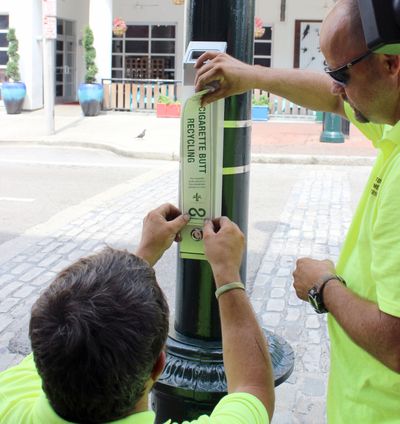New Orleans begins cigarette butt recycling effort

NEW ORLEANS – In New Orleans, discarded butts are being turned into something useful.
The first of 50 cigarette butt recycling receptacles was installed at a downtown intersection Monday. Developers of the program say New Orleans is the first U.S. city to participate in a large-scale recycling effort launched in Canada last year.
Trenton, New Jersey-based recycling company TerraCycle Inc. developed the program in 2012. The first citywide receptacles were placed in Vancouver, B.C., in November 2013.
“Globally we have collected 25 million butts since November of 2012,” said company spokesman Albe Zakes, adding that the company is in talks with officials in Toronto, Sydney, Tokyo, Phoenix and Atlantic City, New Jersey.
Officials with the New Orleans Downtown Development District said joining the program was a no-brainer. Smokers flock to curbside trash bins and public benches for nicotine fixes, and smoking is still allowed in bars that do not serve food. The downtown area is just blocks from the French Quarter and is home to the huge Harrah’s Casino.
That adds up to a lot of cigarette butts.
Kurt Weigle, district president and CEO, said a one-day sweep in 2011 turned up nearly 7,000 cigarette butts downtown.
According to TerraCycle, New Orleans will be paid $4 for each pound of cigarette waste collected.
The organic materials, such as tobacco and paper, are composted.
Cigarette filters, though they look and feel like fiber, are made of cellulose acetate, a plastic. Once collected, they are shredded and bio-toxins removed with the use of gamma radiation, Zakes said.
“It’s the same exact process used on fish and other meats to assure there are no bio-contaminants, so it is very safe,” Zakes said.
The filters are then melted into plastic pellets for industrial use in the same way a plastic bottle would be recycled, Zakes said.
“We only use the pellets for industrial applications, such as plastic lumber and plastic shipping pallets,” he said. “We don’t make any consumer products from this material, mostly because of the stigma around butts.”
Outside a patio bar and restaurant about a block from where the first receptacle was installed Monday, 23-year-old Ryan Schumacher puffed on a cigarette and said the receptacles may help break some “bad habits.” Schumacher said he’s among many smokers guilty of throwing cigarette butts on the ground.
“I’m happy that we have somewhere to put our cigarette butts, now,” he said, but added that there will be smokers who just don’t care. “There’s still going to be the people who are stubborn about it and just throw it on the ground because that’s what they’re used to doing.”
Weigle said he is hopeful the receptacles will get used to help keep downtown clean, improve the quality of life for residents and visitors alike and promote environmental awareness.
“That’s something that’s important to us and our stakeholders, so every chance we get to become a greener downtown, we grasp it,” he said.